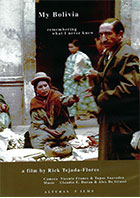
My Bolivia: Remembering What I Never Knew 2017
Distributed by Alturas Films, 1286 61st St, Emeryville, CA 94608. 510-910-1875
Produced by Rick Tejada-Flores
Directed by Rick Tejada-Flores
DVD , color, 57 min.
College - General Adult
Latin America, History, Bolivia
Date Entered: 06/04/2018
Reviewed by Elena Landry, George Mason Libraries, Fairfax, VAIf one is to take award-winning documentary filmmaker Rick Tejada-Flores at his word, before making My Bolivia: Remembering What I Never Knew, for a man of his years, he knew surprisingly little about some very interesting aspects of his family’s history. Yet it quickly becomes suspect that this alleged lack of knowledge is more likely a narrative ploy, as the viewer is drawn into a colorful story, prompted by a series of old photos, depicting lives of wealth and privilege, which the director uses as launching points into examinations of the skeletons in the family closet.
The first is of “El Chaco,” a stone “castle,” built by Jose Luis Tejado Sorzano, the director’s grandfather, who was president of Bolivia from 1934 – 1936. Tejada-Flores reveals that this was the result of a military coup, in which the Bolivian generals, disaffected by a losing war with Paraguay, put his grandfather, the vice president, into power. The Chaco War, (ostensibly fought over oil, which later turned out to be nonexistent) was the bloodiest conflict in Latin American history, claiming the lives of 60,000 Bolivians and 20,000 Paraguayans. After the war, Sorzano was ousted in another coup.
Next presented are old documents and pictures of the family, going back to a colonial will, detailing the values of various slaves who were part of an inheritance at Tiquimpaya, one of the family’s estates. Originally brought over from Africa to work the silver mines of Potosi, when the cold and altitude proved so deadly to such an expensive resource, these people were removed to the coca plantations, where their Afro-Bolivian descendants live to this day, some still farming coca. A brief scene of Saya culture shows how they are still at the very bottom of Bolivian society.
Tejada-Flores’ family is full of interesting characters. Besides his grandfather, there is his glamorous mother, who along with her sister comprised the world’s only team of twin international reporters, and the cousin who was one of the leaders who ultimately engineered the land reforms that were to strip the family of its estates after the Bolivian revolution of the 1950s.
The final major stop is Llojeta, another of the family’s former estates. While rented out to a timber firm in the early 1950s, a certain Klaus Altmann worked there as a supervisor. Altmann turned out to be none other than Klaus Barbie, the Butcher of Lyon. Recruited by the United States Counterintelligence Corps in 1947, Barbie had worked secretly for them until the French discovered his whereabouts, and the Americans smuggled him out to Bolivia via the ratlines. Before his ultimate deportation to stand trial for his war crimes, he reportedly had excellent relations with several high ranking Bolivian officials, while widely known for his German nationalist pronouncements.
More compelling than the Barbie story is the personal relationship the director establishes with the people of Llojeta, where he has worked to modernize the village’s water system, thus finally connecting to the country of his ancestors that he didn’t really discover until in his later years.
I recommend this film to anyone interested in history in general, and particularly the history of a country as poorly understood as Bolivia is, particularly in the United States.